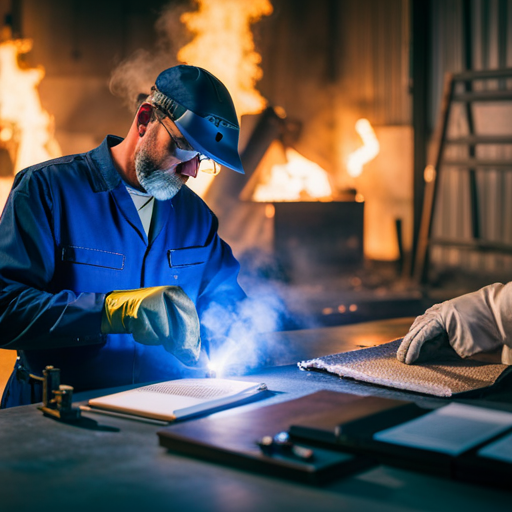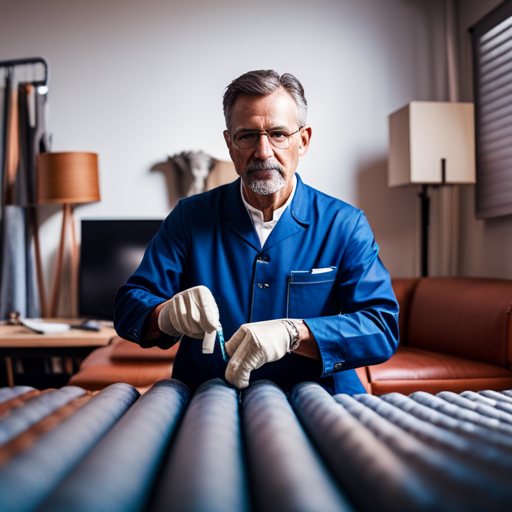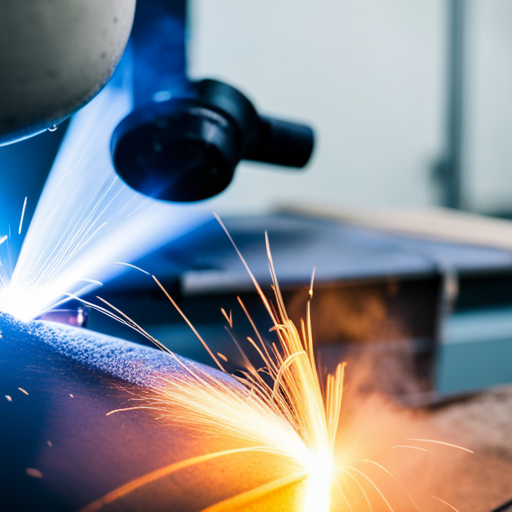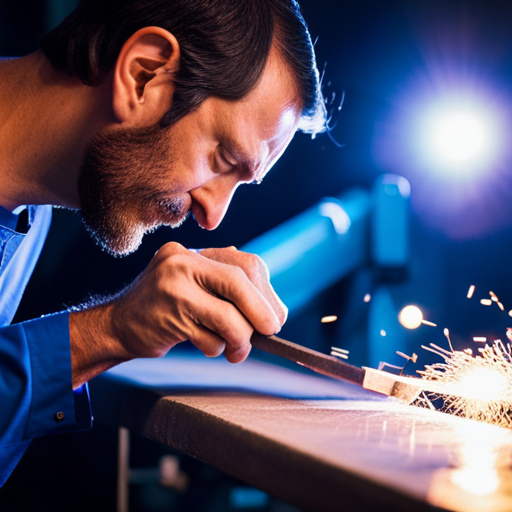Legal Considerations for Upholstery Welding Businesses

Discover the paramount legal considerations for upholstery welding businesses to ensure seamless operations and safeguard against potential liabilities.
From meticulous business registration and compliance with safety regulations to navigating contractual agreements and intellectual property concerns, this article delves into the critical legal framework that underpins the success of upholstery welding ventures.
Gain crucial insights into navigating the legal landscape and fortifying your business for sustained growth and compliance.
Business Registration and Licensing
How should upholstery welding businesses navigate the process of obtaining necessary business registration and licensing?
When starting an upholstery welding business, one of the crucial steps is to decide on a suitable business structure, such as a sole proprietorship, partnership, limited liability company (LLC), or corporation. Each structure has its own tax implications and legal requirements. It’s essential to carefully evaluate the options based on factors like liability protection, tax efficiency, and ease of administration.
Once the business structure is determined, the next step is to register the business with the appropriate local, state, and federal authorities. This typically involves obtaining a business license, tax identification number, and any industry-specific permits or certifications. The specific requirements can vary depending on the location and nature of the upholstery welding business.
Regarding tax implications, the chosen business structure will determine how the business is taxed. For example, sole proprietors report their business income and losses on their personal tax returns, while LLCs and corporations have different tax filing requirements. Understanding these tax implications is crucial for compliance and financial planning.
Compliance With Safety Regulations
Upholstery welding businesses must adhere to safety regulations at all times to ensure the well-being of their employees and comply with legal requirements. Compliance with safety regulations is crucial for the smooth operation of the business and the protection of workers. To achieve this, businesses should prioritize the following:
-
Safety Training: Providing comprehensive safety training to all employees is essential. This includes proper handling of welding equipment, understanding potential hazards, and implementing safety protocols. Regular refresher courses should also be conducted to keep safety practices current and at the forefront of employees’ minds.
-
Equipment Maintenance: Upholstery welding businesses must establish a routine maintenance schedule for all welding equipment. Regular inspections and maintenance not only ensure the equipment functions properly but also minimizes the risk of accidents or malfunctions.
-
Safety Inspections: Conducting regular safety inspections of the workplace can help identify potential hazards and ensure compliance with safety regulations. Addressing any issues promptly can prevent accidents and demonstrate a commitment to safety.
-
Personal Protective Equipment (PPE): Upholstery welding businesses should provide and enforce the use of appropriate PPE, such as welding helmets, gloves, and protective clothing, to minimize the risk of injuries. Regular checks and replacements of damaged PPE are also crucial to maintain a safe working environment.
Understanding Liability and Insurance
As upholstery welding businesses navigate the complexities of liability and insurance, it is crucial to understand the importance of liability coverage, the different types of insurance available, and the legal protection strategies that can safeguard the business from potential risks.
By comprehensively grasping these aspects, businesses can effectively mitigate potential liabilities and ensure they are adequately covered in the event of unforeseen circumstances.
This understanding forms the foundation for establishing a robust risk management framework and ensuring the long-term sustainability of the business.
Liability Coverage Importance
A comprehensive liability coverage is essential for upholstery welding businesses to protect against potential financial and legal risks. Upholstery welding businesses face various liability risks due to the nature of their work, making it crucial to have the right coverage options in place. Here are some key reasons why liability coverage is important for upholstery welding businesses:
-
Protection from third-party claims: Liability coverage provides financial protection in case a third party, such as a customer or supplier, files a claim against the business for injury or property damage.
-
Legal defense coverage: In the event of a lawsuit, liability coverage can help cover the costs of legal defense, including attorney fees and court expenses.
-
Business continuity: Adequate liability coverage ensures that the business can continue operating even in the face of unexpected liabilities.
-
Peace of mind: Having comprehensive liability coverage gives business owners peace of mind, knowing that they are financially protected against potential liabilities.
Types of Insurance
Understanding liability and insurance is crucial for upholstery welding businesses to protect themselves from potential risks and ensure financial security. Insurance coverage for upholstery welding businesses typically includes general liability insurance, which protects against third-party claims of bodily injury or property damage. Additionally, product liability insurance covers claims related to products sold or supplied by the business. It’s essential to carefully consider coverage limits to ensure adequate protection. Coverage limits determine the maximum amount an insurer will pay for a covered claim, and it’s important for businesses to assess their potential liability risks when setting these limits. Upholstery welding businesses should also explore additional coverage options, such as professional liability insurance, to safeguard against errors or omissions in the services provided. Understanding and selecting the right insurance coverage and appropriate coverage limits are vital steps in protecting the business from potential liabilities.
Moving on to legal protection strategies…
Legal Protection Strategies
How can upholstery welding businesses effectively mitigate potential liabilities through legal protection strategies and comprehensive insurance coverage?
Employment Laws Compliance: Upholstery welding businesses must adhere to employment laws to avoid legal issues related to hiring, wages, and working conditions.
Tax Obligations: Ensuring compliance with tax regulations is crucial. Upholstery welding businesses should accurately report and pay taxes to avoid penalties.
Comprehensive Liability Insurance: Obtaining comprehensive liability insurance can safeguard the business from potential legal claims and financial losses resulting from accidents or injuries.
Professional Indemnity Insurance: This type of insurance protects the business from legal claims related to the quality of work or professional advice provided.
By understanding employment laws, fulfilling tax obligations, and acquiring comprehensive insurance coverage, upholstery welding businesses can significantly reduce potential legal risks.
Moving forward, it is essential for these businesses to also consider environmental regulations and waste disposal.
Environmental Regulations and Waste Disposal
Complying with environmental regulations and properly disposing of waste is a critical aspect of operating an upholstery welding business in today’s regulatory landscape. Upholstery welding businesses must prioritize waste management to minimize their environmental impact. Implementing effective waste disposal practices not only ensures compliance with legal requirements but also contributes to environmental sustainability.
| Waste Type | Disposal Method | Regulatory Compliance |
|---|---|---|
| Fabric Scraps | Recycling centers or textile waste facilities | Ensure compliance with local waste management regulations |
| Chemical Residues | Hazardous waste disposal facilities | Adhere to environmental protection agency guidelines |
| Metal Shavings | Metal recycling facilities | Comply with scrap metal recycling regulations |
Proper waste disposal not only avoids legal repercussions but also enhances the business’s reputation as a responsible corporate citizen. Upholstery welding businesses should establish clear waste disposal protocols and provide training to employees to ensure adherence to environmental regulations. By integrating sustainable waste management practices, businesses can demonstrate their commitment to environmental stewardship and gain a competitive edge in the market.
Transitioning into the subsequent section about ‘contractual agreements and client relations’, it is essential for upholstery welding businesses to establish clear contractual agreements that address environmental responsibilities and waste disposal obligations.
Contractual Agreements and Client Relations
Establishing robust contractual agreements is essential for upholstery welding businesses to effectively manage client relations and ensure legal compliance. Upholstery welding businesses should prioritize clear and detailed contracts to avoid misunderstandings and disputes with clients.
Key considerations for contractual agreements and client relations include:
-
Clear Communication: Upholstery welding businesses must clearly communicate the scope of work, timelines, payment terms, and any potential limitations or risks to the client. This transparency helps manage expectations and minimizes the likelihood of misunderstandings.
-
Dispute Resolution Mechanisms: Contracts should outline a clear process for resolving disputes, such as mediation or arbitration, to provide a structured approach for addressing conflicts with clients. This can help prevent disagreements from escalating into costly and time-consuming legal battles.
-
Client Approval Processes: Clearly defining how clients can approve work, request changes, and provide feedback ensures that both parties are aligned throughout the project, reducing the likelihood of disagreements or dissatisfaction.
-
Legal Compliance: Upholstery welding businesses should ensure that their contractual agreements adhere to relevant laws and regulations governing client relations, such as consumer protection and contract laws, to avoid legal complications.
Intellectual Property and Copyright Considerations
Upholstery welding businesses must carefully address intellectual property and copyright considerations to safeguard their creative works and designs. This involves understanding the importance of trademark protection and design patents. Trademark protection ensures that the business’s branding, such as logos or slogans, is legally protected from unauthorized use by others. On the other hand, obtaining design patents can provide legal protection for the unique ornamental design of a functional item, which can include aspects of the upholstery welding business’s products.
| Intellectual Property Considerations | Description | Importance |
|---|---|---|
| Trademark Protection | Safeguards the business’s branding, including logos and slogans | Ensures exclusive use of business identity |
| Design Patents | Provides legal protection for the unique ornamental design of functional items | Protects unique design elements |
Frequently Asked Questions
What Are the Specific Welding Certifications and Qualifications Required for Upholstery Welding Businesses?
Specific welding certifications and qualifications required for upholstery welding businesses include AWS Certified Welder, ASME Boiler and Pressure Vessel Code certification, and knowledge of safety standards. Upholstery welding businesses must also adhere to material disposal regulations and ensure intellectual property and contractual liability protection.
How Should Upholstery Welding Businesses Handle Disputes With Clients Over the Quality or Safety of Welded Products?
Handling disputes over the quality or safety of welded products is a critical aspect of running an upholstery welding business. Open, transparent communication with clients and a commitment to resolving issues promptly is key to maintaining trust and reputation.
Are There Any Specific Regulations or Guidelines for Handling and Disposing of Welding Materials and Byproducts in the Upholstery Industry?
In the upholstery industry, handling and disposal of welding materials and byproducts are subject to specific regulations and guidelines. Upholstery welding businesses must adhere to these requirements to ensure compliance and environmental safety.
What Steps Should Upholstery Welding Businesses Take to Protect Their Designs and Products From Infringement or Unauthorized Use by Competitors?
To safeguard their designs and products from unauthorized use, upholstery welding businesses must prioritize intellectual property protection. This includes registering copyrights for unique designs and pursuing legal action against any instances of copyright infringement.
How Can Upholstery Welding Businesses Ensure That Their Contracts With Clients Adequately Protect Their Interests and Liabilities?
When managing contractual obligations, upholstery welding businesses must ensure that their contracts with clients thoroughly outline liability protection measures. This includes clarity on responsibilities, indemnity clauses, and adherence to relevant legal standards.
Conclusion
In the intricate tapestry of the upholstery welding business, it is crucial to weave a strong legal foundation. Just as a skilled welder meticulously joins metal pieces together, a business must carefully adhere to registration, safety, liability, and environmental regulations.
Like a well-crafted piece of furniture, a business’s contractual agreements and intellectual property considerations must be solidly constructed. By understanding and addressing these legal considerations, an upholstery welding business can ensure a sturdy and enduring foundation for success.

Dillon Hince, an expert in the realm of upholstery welding, brings a wealth of knowledge and experience to the craft. As the driving force behind nodpu.com, Dillon combines a passion for precision and creativity, offering unique insights into the art of seamlessly melding fabrics and materials. With a commitment to excellence, Dillon Hince is your go-to resource for innovative upholstery welding techniques, transforming ordinary pieces into extraordinary works of functional art.





